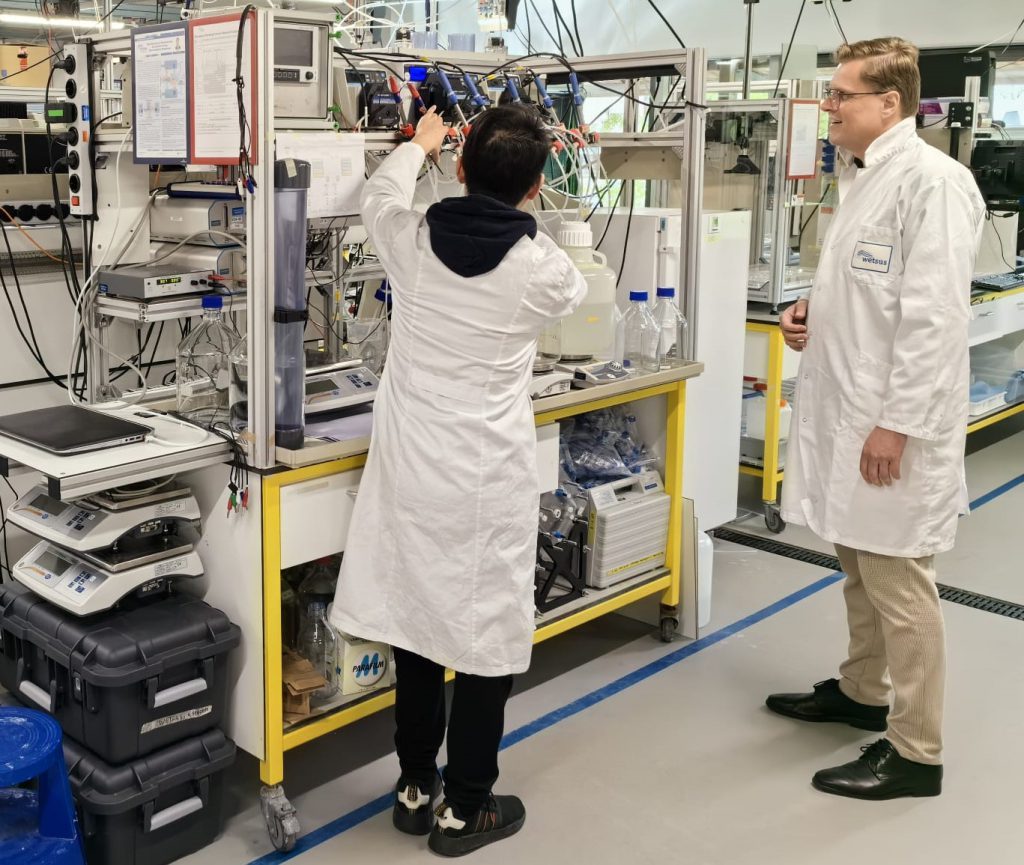Brine valorization by using bipolar membranes for acid and base production and scaling prevention
This project addresses the pressing need for sustainable brine management in desalination processes. Within the Wetsus program, we aim to increase the water recovery and reduce scaling in desalination processes through innovative methodologies. By exploring chemical-free electrochemical softening and decarbonization using on-site acid and base production from the brine by bipolar membrane electrodialysis (BPMED), we strive to achieve near-zero liquid discharge levels while minimizing environmental impact of desalination.
Our research faces the challenge of utilizing real waste brines with diverse ion compositions from different feed water types (e.g. ground, surface, effluent water), requiring adaptation of BPMED techniques. We aim to develop efficient desalination schemes that can effectively handle the complexities of diverse waste brines, enabling higher water recovery rates in desalination without the need for chemical additives.
Research challenges
Previous studies have extensively explored brine valorization methods, yet few have addressed this in combination with the challenge of scaling in real waste brines. While chemical methods have been proposed, their environmental impact and operational constraints remain significant. Additionally, integrating electrochemical and crystallization processes presents complex engineering challenges, especially when dealing with diverse brine compositions.
Despite past research on BPMED, the interaction between brine softening and BPMED remains relatively unexplored. By leveraging acids and bases generated from softened brines, our project aims to revolutionize brine treatment. Specifically, we propose a novel approach that integrates BPMED with crystallization, offering a sustainable solution for brine management. Moreover, addressing the variability in brine compositions, including those with low sodium chloride for making up the acid and base, presents an opportunity for innovation in process design and operation. We aim to establish a stable and feasible process that maximizes water recovery from desalination while minimizing environmental impact and operational complexities.
Your assignment
As part of this project, you will investigate and develop chemical-free electrochemical softening and decarbonization schemes using bipolar membranes. Your aim will be to enhance the water recovery in desalination processes while minimizing scaling issues. You will employ innovative methods such as compartmentalized electrodialysis and crystallization reactors integrated into a process scheme, contributing to sustainable brine management practices. In the laboratory, you will have your setup for studying membrane configurations, crystallization reactor designs, and process parameters when these are applied to different brine compositions, including real brines from our industry partners. You can also test the best configurations and operations on a pilot scale, potentially at one of the industry’s premises.
Your Profile
You are a motivated researcher with a background in chemical engineering or related fields. Experience with membrane technologies and electrochemical processes is preferred. You have an affinity for practical engineering solutions and can operate setups in the laboratory and on location.
Keywords: Desalination, electrodialysis, crystallization, process engineering, bipolar membranes
Supervisory Team: University promotor and co-promotor: Prof. Dr. Ir. Emile Cornelissen (Ghent University, Particle and Interfacial Technology Group)
Wetsus supervisor: Dr. ir. Jan Post (daily supervisor)
Project partners: Desalination & Concentrates
Only applications that are complete, in English, and submitted via the application webpage before the deadline will be considered eligible.
Guidelines for applicants: https://phdpositionswetsus.eu/guide-for-applicants/
